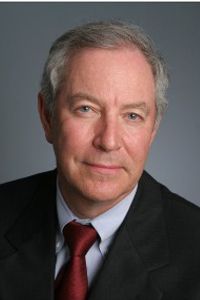John B. Vandenorth
John B. Vandenorth is a former Second Judicial District judge for Ramsey County, Minnesota.[1] Van de North retired from the court in 2015.[2]
Biography
Education
Van de North received his B.A. degree from St. John's University in Collegeville in 1967 and his J.D. degree from the University of Notre Dame Law School in 1970. Before beginning his legal career, he served in the Army from 1971 to 1975. Later, he received formal judicial training, from the Minnesota Supreme Court in 1999 and the National Judicial College in 2006. He completed the Supreme Court's Rostered Neutral (Mediation and Arbitration) Training Program in 1997.[1]
Career
- 1998-2019: Judge, Second Judicial District
- 1989-1991: Board of Directors, Briggs and Morgan
- 1977-1998: Partner, Briggs and Morgan
- 1975-1977: Attorney, Holmes and Graven
- 1973-1975: Special assistant Minnesota attorney general, Minnesota Pollution Control Agency and Minnesota Public Utilities Commission
- 1970-1971: Special assistant Minnesota attorney general, Department of Revenue[1]
Elections
2012
- See also: Minnesota judicial elections, 2012
Vandenorth ran unopposed in the general election November 6, 2012.[3] He received 98.52 percent of the vote.[4]
Noteworthy cases
After decades, Catholic church must release names of accused clergy
- See also: Minnesota Second Judicial District
Decades after reports of Catholic clergy members sexually abusing minors, a Minnesota court has required the publication of the names of all accused priests. In Ramsey County, Minnesota, a judge ruled the Archdiocese of St. Paul and Minneapolis must release names of 33 accused priests, while the Diocese of Winona must release the names of its 13 accused. Both lists are due by December 17.[5]
In addition to requiring the names of the accused, Judge John Van de North of the state’s Second Judicial District ruled on December 2, 2013 that the church must disclose each priest’s year of birth, when each priest was ordained, which parishes he served, his current ministerial status, his current residence and whether he is still alive. Archdiocese attorney Thomas Wieser said that nine of the 33 accused are now dead.[5][6]
Attorneys and advocates for the abused children have been seeking the release of these names for almost three decades.[7]
Previously, a 2009 ruling allowed the archdiocese to keep its list of names secret. It was Archbishop John Nienstedt who last month, following new allegations of clergy sex abuse, created a task force to review the church’s response, and also pledged to publicize some of the priests’ names. Several church leaders abruptly resigned or were removed after the recent allegations, including Nienstedt’s vicar general Reverend Peter Laird. Archdiocese attorney Thomas Wieser offered 29 of the 33 names, but the court ruled the church must release all 33.[5]
Wieser said that allegations against three of the accused could not be substantiated and one was not on record as having served in the archdiocese. Because of this, the archdiocese opposed release of these four names. Van de North said that if the archdiocese provides a convincing explanation, the names could be withheld. However, Wieser said Nienstedt believed the issue had become a “distraction” and “wants the healing to begin.”[5][6]
The archdiocese released a statement of approval Monday night that read,
| “ | The Archdiocese of St. Paul and Minneapolis is grateful for the approval of Ramsey County court to release information relating to priests who have been credibly accused of sexual abuse of minors in our archdiocese.[5][8] | ” |
Van de North also ordered the release by January 6 of names added to the list since the original one was assembled in 2004. According to Wieser, there is only one such priest, Rev. Curtis Wehmeyer, who is serving a five-year prison sentence for child sexual abuse and child pornography.[6]
“The era of secrecy around the identities of those offenders is now drawing to and nearing an end,” St. Paul attorney Jeffrey Anderson said.[7] He added, “Survivors who suffered alone in silence, thinking they are the only ones abused now know they may not be alone.”[7]
According to an attorney for the Diocese of Winona, the diocese still opposes releasing its list.[6]
See also
Footnotes
- ↑ 1.0 1.1 1.2 Official biography of Judge Van de North
- ↑ Office of Governor Mark Dayton & Lt. Governor Tina Smith, "Governor Dayton Appoints Richard H. Kyle, Jr. to Fill Second Judicial District Vacancy," July 28, 2015
- ↑ Minnesota Secretary of State website
- ↑ Minnesota Secretary of State Election Results
- ↑ 5.0 5.1 5.2 5.3 5.4 ‘’StarTribune,’’ “Judge orders St. Paul archdiocese, Winona diocese, to release lists of accused priests,” December 3, 2013
- ↑ 6.0 6.1 6.2 6.3 ‘’MPR News,’’ “Judge orders names of 46 accused priests to be released,” December 2, 2013
- ↑ 7.0 7.1 7.2 ‘’CBS Minnesota,’’ “Judge: Church must give names of all accused priests,” December 2, 2013
- ↑ Note: This text is quoted verbatim from the original source. Any inconsistencies are attributable to the original source.
Federal courts:
Eighth Circuit Court of Appeals • U.S. District Court: District of Minnesota • U.S. Bankruptcy Court: District of Minnesota
State courts:
Minnesota Supreme Court • Minnesota Court of Appeals • Minnesota District Courts • Minnesota Problem-Solving Courts • Minnesota Tax Court • Minnesota Workers' Compensation Court of Appeals
State resources:
Courts in Minnesota • Minnesota judicial elections • Judicial selection in Minnesota




